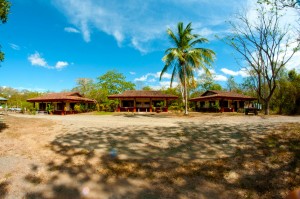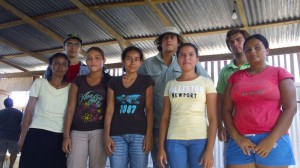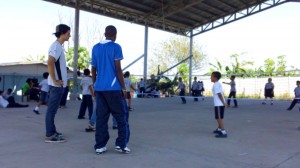Improving communities in the dry tropics
From the pervasive green tinted by the constant rains of the humid tropics, to the sepia golden tones painted by the tenacious sun characteristic of the dry tropic in midsummer; from the EARTH campus in Guácimo, we move to the EARTH- La Flor campus, in Liberia, Guanacaste.
A few miles away from Liberia, the community of San Rafael is covered by white dust under the heat of the early morning. There, Katia López, a happy and energetic housewife, recites the ingredients of the compost she has learned to make with students Alejandro Fernández (‘14, Mexico), Mario Miraglia (‘14, Ecuador) and Lotar Marich (‘14, Ecuador), who have been doing community service in the area for more than a month.
For seven weeks, third year students from EARTH have the real-world experience of being leaders in sustainable development in Costa Rica’s dry tropics. During this time they live with a host family in the community, spend two days working in a local business, two days doing community service and one day dedicated to academic activities at the La Flor campus.
Community members in San Rafael don’t have drinkable water at home and have to carry water from a communal faucet to their houses. In fact, lack of water is the main challenge affecting this community and according to many students this may be the be the greatest contrast they have seen during their education at EARTH; while at the Guácimo campus in the humid tropics they have to deal with flooded crops due to excessive rainfall, here it´s the flip side of the coin.
Alejandro, Mario and Lotar have focused on training members of the community to produce their own crops, taking into account the space and lack of water. With workshops on peri-urban agriculture and composting, Katia and five other women, who have gathered this morning in an improvised classroom in the town’s center, joyfully recount that their first vegetables are beginning to grow.
“Before they [the EARTH students] came, we had no idea how to do this,” explains Daisy González. “To be able to cultivate allows us to save a lot and even gives us the possibility of earning some extra money.”
“In return we have taught them to laugh,” adds Lorena Tijerino, another workshop member. “They are very serious in their work.”
Recycling lifestyles
Back in downtown Liberia, the city is preparing for regional festivals. There, Dennis Espinoza and Mainor Segnini, both Costa Ricans from the class of 2014 are working in collaboration with an organization that helps rehabilitate drug addicts to develop a plan to recycle the waste that will be produced during the 12 days of the festival. This will be the first time this activity has had a waste management plan and these EARTH students are “making headway” in an event that welcomes thousands of visitors. Also during their stay in Guanacaste they have trained recovering addicts in waste management.
“It has been a great responsibility, because we are representing the University,” says Dennis as he prepares the signage that will be used to classify waste. “Here we are working in the real world and we have to do our best,” he concludes.
A few kilometers further, in the community of Filadelfia, Wilner Valbrum ( ’14 ,Haití), Samuel Kwakye (’14, Ghana), Cledy Canchari (’14, Perú) and Sofía Arguedas (’14, Costa Rica) work with a an organization of women dedicated to waste management. While some of their children run around the huge piles of waste, the women, many of them single mothers, learn how to better use the recyclable materials that come into their community. Additionally, Cledy and Sofia have been working with the local high school to build a bio-digester.
“That was the most rewarding moment,” Cledy assures, “when high school staff thanked us for helping so much.”
Sowing entrepreneurship and sustainability
Diego Delgado (’14, Costa Rica) and Aloyce Gonzaga (’14, Kenya) are surrounded by children from the Buenavista school in the community that carries the same name, also located in Guanacaste. There, at an improvised volleyball court, they celebrate their “Sports Day.”
However, rather than just playing with the children, these EARTH students have decided to share their knowledge.
After having invited, house by house, all members of the community to get involved in a project to make soap out of oil and having no one show up, Diego and Aloyce decided to focus their project on children. In that way, through them, future generations are carrying the message of sustainability to the Buenavista households.
“The children collect 1000 milliliters of used oil, and they take home 500 grams of soap,” Diego explains.
The soap is produced in a laboratory that belongs to the Buenavista Hotel, as a part of the hotel’s social commitment, where the students work at the beginning of each week.
“It’s a way for children to learn not to throw away oil, which is a huge source of contamination,” Aloyce explains. He also works with fifth and sixth grade students selling lemonade as a way to promote entrepreneurship. “The idea is to encourage the kids to start creating their products, do marketing and learn how to segment the market, as we do at EARTH.” Aloyce adds, “With this they learn to think as entrepreneurs at a young age.”
Under the bright sun of the dry tropics, from the hands of EARTH students these projects begin to shed new hope in these communities.
Want to bring hope to your community? EARTH is now accepting applications for the 2014 entering class. Grow with us!







